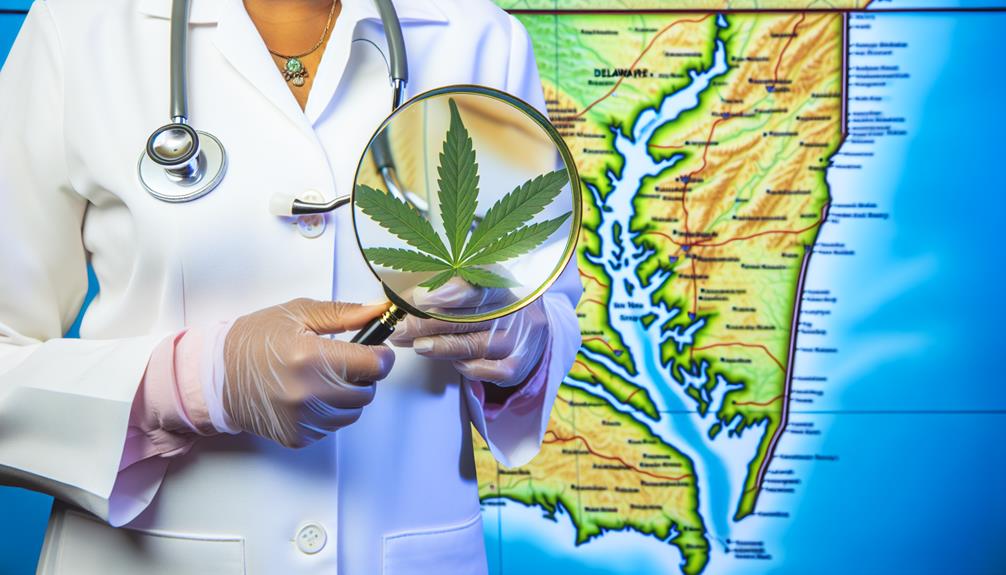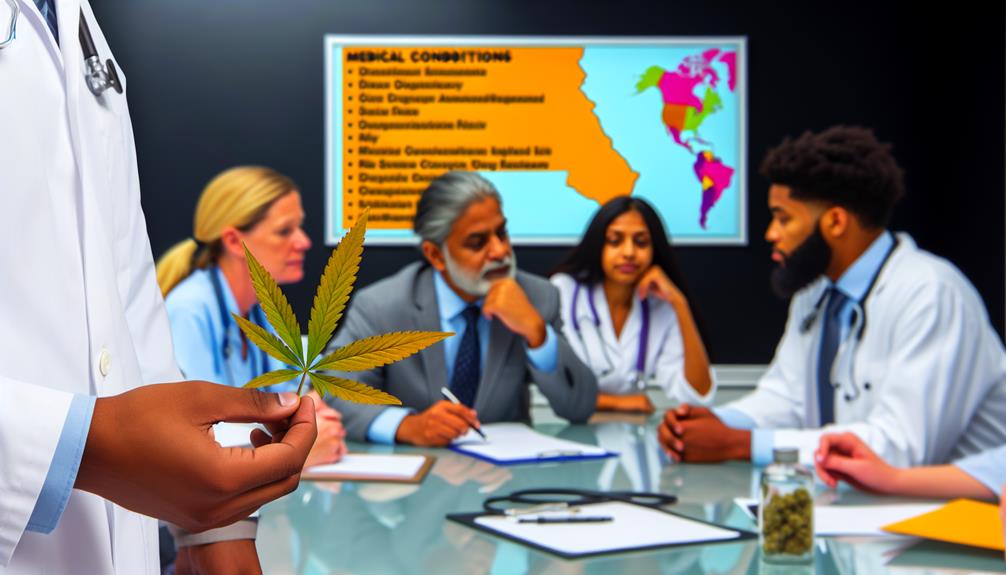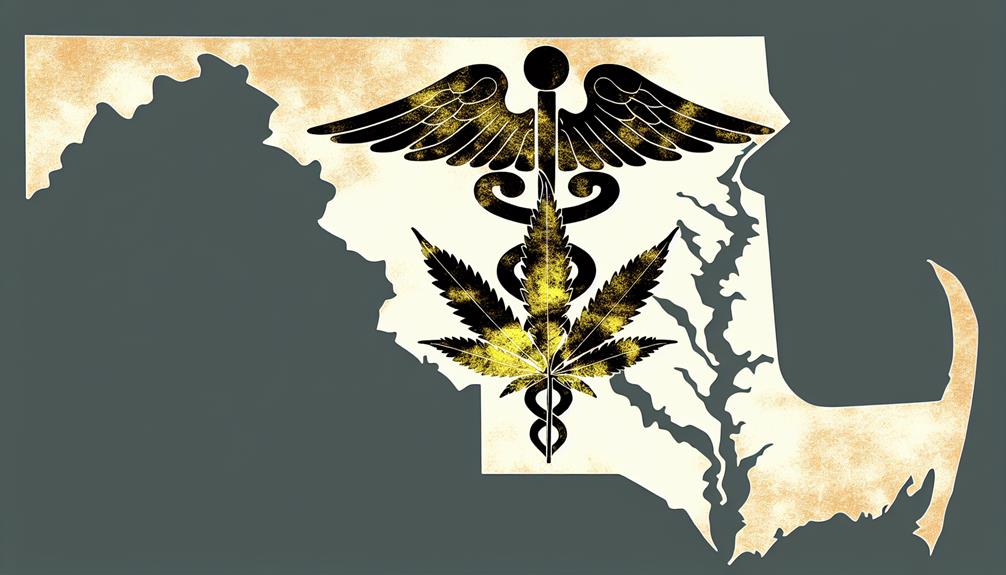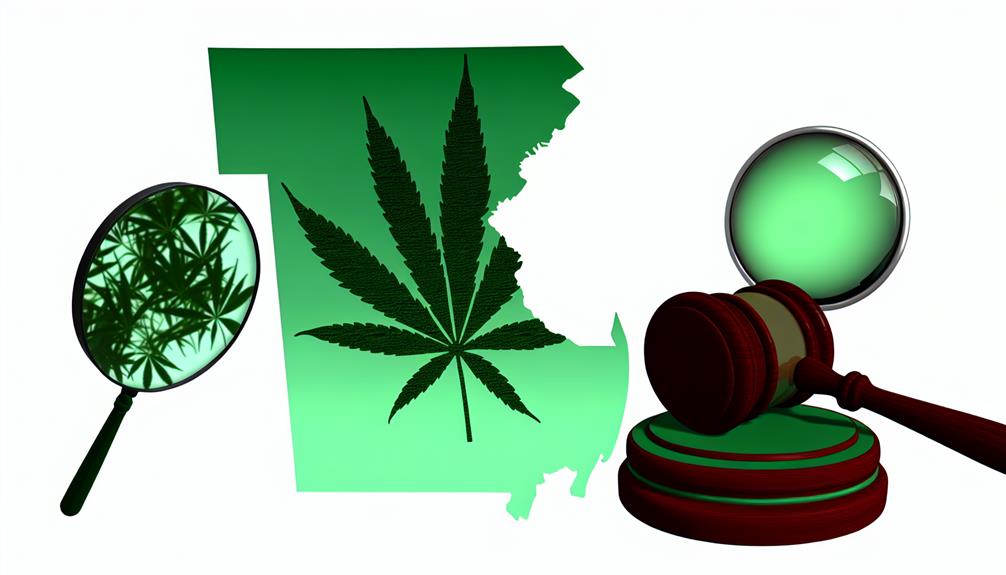Did you know there’s a growing debate in Delaware about the use of medical marijuana for non-qualifying conditions? Despite the state’s Medical Marijuana Act, which permits the use of the drug for certain conditions, a significant number of individuals with non-qualifying ailments report finding relief through its use. This situation has sparked discussions about whether the law should be expanded to accommodate more conditions. As you delve into this topic, you’ll encounter a wide range of perspectives, each adding depth to an issue that’s still largely uncharted territory. What could be the implications for patients, caregivers, and the broader healthcare system?
Understanding Delaware’s Medical Marijuana Laws

Since Delaware passed its Medical Marijuana Act in 2011, understanding the state’s laws surrounding medical marijuana has become crucial for both patients and providers.
You’re required to understand the legal distinctions surrounding patient eligibility for medical marijuana usage because ignorance is no excuse in legal matters.
To qualify, patients must be residents of Delaware who are at least 18 years old and diagnosed with a qualifying condition. A licensed physician must certify their condition and need for medical marijuana treatment.
Next, patients must apply to the Delaware Department of Health and Social Services (DHSS), providing necessary documents along with a non-refundable application fee.
The legal distinctions are significant. Under Delaware law, eligible patients and their caregivers can possess up to six ounces of medical marijuana but they can’t grow their own plants.
Furthermore, only state-licensed compassion centers are permitted to dispense medical marijuana.
Also, remember that federal law still classifies marijuana as a Schedule I Controlled Substance. Consequently, even with a medical marijuana card, you’re not authorized to transport marijuana across state lines.
Non-Qualifying Conditions: A Grey Area

While understanding the eligible conditions for medical marijuana use in Delaware is important, it’s also necessary to be aware of those conditions that don’t qualify. This is where a grey area exists. Non-qualifying conditions, as the term implies, are those health issues that don’t meet the established criteria for medical marijuana use.
However, this doesn’t mean that those suffering from non-qualifying conditions don’t experience relief from medical marijuana. Here, personal anecdotes often tell a different story. Many individuals with non-qualifying conditions have shared their experiences, detailing how medical marijuana has improved their quality of life.
Yet these personal anecdotes, though compelling, don’t necessarily lead to changes in legislation. They’re valuable for understanding the scope of the grey area but can’t substitute for clinical research when it comes to policy-making.
In the absence of legal access to medical marijuana, those with non-qualifying conditions often turn to alternative therapies. From acupuncture to herbal remedies, these individuals seek out other ways to manage their symptoms.
This situation highlights the challenges faced by those navigating the complex landscape of Delaware’s medical marijuana laws.
Implications for Patients and Caregivers

Navigating the implications of Delaware’s medical marijuana laws can prove challenging for both patients and caregivers.
As a patient, understanding your rights is essential. You’re entitled to access medical marijuana if your condition is listed under the qualifying conditions. If it isn’t, you might find yourself traversing a complex labyrinth of legislation, seeking alternative paths for relief.
On the other hand, if you’re a caregiver, your responsibilities may seem overwhelming. You’re tasked with ensuring the patient’s wellbeing which includes respecting their rights and making informed decisions about treatment options.
Navigating medical marijuana laws can be a balancing act. You must stay within legal boundaries while advocating for the patient’s needs.
Doctors’ Perspectives on Non-Qualifying Conditions

You might wonder how doctors feel about non-qualifying conditions? They’ve shared insights that present a multifaceted view. While they recognize the therapeutic potential of medical marijuana, they also express concerns about its use for conditions not officially qualified by Delaware.
Doctors’ insights highlight several key points:
- They’re aware of patients who find relief from medical marijuana even for non-qualifying conditions.
- They worry about potential risks and side effects, especially when used without professional guidance.
- They’re open to exploring treatment alternatives, including medical marijuana, as long as they’re safe and effective.
These insights reflect doctors’ commitment to patient safety and effective treatment. They’re not against medical marijuana per se but are cautious about its use for non-qualified conditions.
They’d prefer to rely on scientific evidence and research when recommending treatment alternatives.
The takeaway here is that doctors want what’s best for their patients. They’re open to new treatment methods such as medical marijuana but they also want to ensure they’re making informed, responsible decisions.
As discussions around medical marijuana continue, doctors’ perspectives will remain a vital part of the conversation.
The Ongoing Legislative Debate

The tug-of-war between advocates and opponents of medical marijuana is a prominent feature in Delaware’s ongoing legislative debate.
You’ll find that advocacy strategies play an essential role in this contentious issue. Proponents argue for the benefits of medical marijuana citing its potential to alleviate severe health conditions that don’t fall under the current qualifying conditions. They employ evidence-based arguments and patient testimonies to push for legislative changes.
Opponents raise concerns about potential misuse and societal impact. They press for stringent regulations and thorough research before any policy changes are made. These legislative challenges create a complex landscape requiring careful navigation.
In this debate, it’s important for you as someone who desires to serve others, to understand the nuances. Legislative changes aren’t just about amending laws; they involve a careful balance of listening to the needs of the community, weighing the scientific evidence, and considering societal implications.
The debate over medical marijuana in Delaware indeed presents a complex challenge but it’s also an opportunity for you to contribute to a cause that could potentially serve many.
Case Studies: Patient Experiences

In considering the landscape of medical marijuana in Delaware, it’s crucial to take into account patients’ experiences.
Patient anecdotes and treatment outcomes provide invaluable insights into the realities of using medical marijuana for non-qualifying conditions.
Let’s explore three real-life stories:
- Patient One suffered from a debilitating illness not listed among Delaware’s qualifying conditions. Despite this, they found relief in medical marijuana – a stark contrast to the limited results from conventional treatments.
- Patient Two also had a non-qualifying condition. They experienced a significant reduction in their symptoms after turning to medical marijuana, enhancing their overall quality of life.
- Patient Three’s story is a demonstration of the potential of medical marijuana. Despite their condition being non-qualifying, the treatment outcomes surpassed their expectations reducing pain and increasing functionality.
These stories underscore the need for a thorough review of Delaware’s current medical marijuana legislation.
They highlight potential benefits and emphasize broadening access to those with non-qualifying conditions.
As you consider these stories understand that they represent real people seeking improved health and wellbeing.
Potential Benefits of Medical Marijuana

Unlocking the potential of medical marijuana could revolutionize healthcare in Delaware. It’s not just about alleviating symptoms but also about empowering patients.
Medical marijuana offers a form of treatment that you control, putting the power in your hands. The therapeutic potential of medical marijuana is immense. It’s been shown to provide relief for a variety of medical conditions, from chronic pain to epilepsy, multiple sclerosis to cancer.
Imagine being able to manage your symptoms, reduce your discomfort and improve your quality of life all through a natural remedy.
Beyond physical health, medical marijuana can also help with mental health conditions. For those struggling with PTSD or anxiety it offers a potential path to stability and relief.
But it’s not just about treatment. Medical marijuana could also help in prevention. There’s evidence suggesting it can reduce the risk of neurodegenerative diseases offering hope for conditions currently lacking effective treatment options.
Risks and Controversies Associated

While the potential benefits of medical marijuana are substantial, it’s equally important to evaluate associated risks and controversies. Consider ethical considerations and patient safety concerns that come into play.
Patient safety is paramount. There are cases where marijuana can interact negatively with other medications or exacerbate existing conditions. Additionally, the long-term effects of medical marijuana are still being studied, leaving a degree of uncertainty.
Ethical considerations are equally important. There’s a fine line between treatment and potential misuse or abuse. The risk of fostering dependency especially among patients with a history of substance abuse can’t be ignored.
Here are a few key points to remember:
- Medical marijuana, like any medication, can have side effects and adverse reactions. It’s vital to monitor and manage these potential risks.
- Ethical guidelines must be established and followed to prevent misuse. This includes monitoring dosage and ensuring medical marijuana is only used for its intended purpose.
- Patient education is critical in mitigating risks. Patients need to be fully aware of potential side effects and the risk of dependency.
In the pursuit of serving others it’s necessary to weigh benefits against these risks and controversies.
Comparisons With Other States’ Policies

Navigating the labyrinth of medical marijuana policies can be challenging but it’s worth comparing Delaware’s approach with those of other states. When you investigate policy comparisons patterns start to emerge. Some states like California have broader guidelines allowing physicians to recommend marijuana for any severe health condition they believe it could benefit.
On the other hand, states like Utah have stricter state regulations limiting marijuana use to a specific list of qualifying conditions. Delaware falls somewhere in the middle permitting medical marijuana for a range of conditions but not as broad as states like California.
Yet, what sets Delaware apart is its unique policy regarding non-qualifying conditions. By allowing physicians to recommend marijuana for conditions not on the official list Delaware provides flexibility unseen in many states bridging the gap between strict and lenient policies.
This policy empowers medical professionals to use their judgement in serving patients’ needs. However, it’s essential to remember that these differences in state regulations reflect diverse attitudes towards medical marijuana shaped by local cultures histories and public health concerns.
Understanding these differences can help you navigate the complex landscape of medical marijuana policy.
Future Projections for Delaware’s Legislation

Looking into the future of Delaware’s medical marijuana legislation it’s clear that it’s poised for evolution. As you navigate this landscape understanding future trends and potential legislative changes is essential.
Firstly there’s a visible trend towards expanding qualifying conditions. It’s becoming increasingly apparent that medical marijuana has potential benefits for conditions not currently covered under Delaware’s legislation. This could lead to more inclusive laws in the future.
Legislative changes may also involve adjusting the amount of medical marijuana a patient can possess. Current restrictions may be viewed as limiting for patients with severe conditions. The future could see laws that are more attuned to patient needs.
Furthermore cultivation laws may undergo changes. Currently only licensed dispensaries can grow marijuana. This might evolve to allow patients to grow their own medicine a trend seen in other states which could make its way to Delaware.
Here’s what you can anticipate:
- Expansion of qualifying conditions
- Revisions on possession limits
- Changes to cultivation laws
Stay informed and adaptable. The goal is to better serve patients and understanding these future trends will be significant in achieving this.
Conclusion
As you navigate Delaware’s complex medical marijuana landscape imagine a future where access isn’t limited by current qualifying conditions. Picture relief spreading across faces as symptoms ease. However remember the ongoing debate risks and controversies. Compare with other states recognizing the potential for change. Amid the uncertainties visualize an informed choice – your choice. Let’s hope Delaware’s legislation evolves enabling broader safe access to this promising therapy enhancing quality of life for more patients.
If you’re curious to learn more about how medical marijuana might help you or a loved one I invite you to visit Cannabis Docs of Delaware. Our friendly team is here to provide you with the information you need. Feel free to give us a call at (855) 420-6797. We’re excited to help guide you through this journey and answer any questions you may have!
The post Medical Marijuana for Non-Qualifying Conditions in Delaware appeared first on Delaware Cannabis Docs.
source https://delawarecannabisdocs.com/medical-marijuana-for-non-qualifying-conditions-in-delaware/

No comments:
Post a Comment